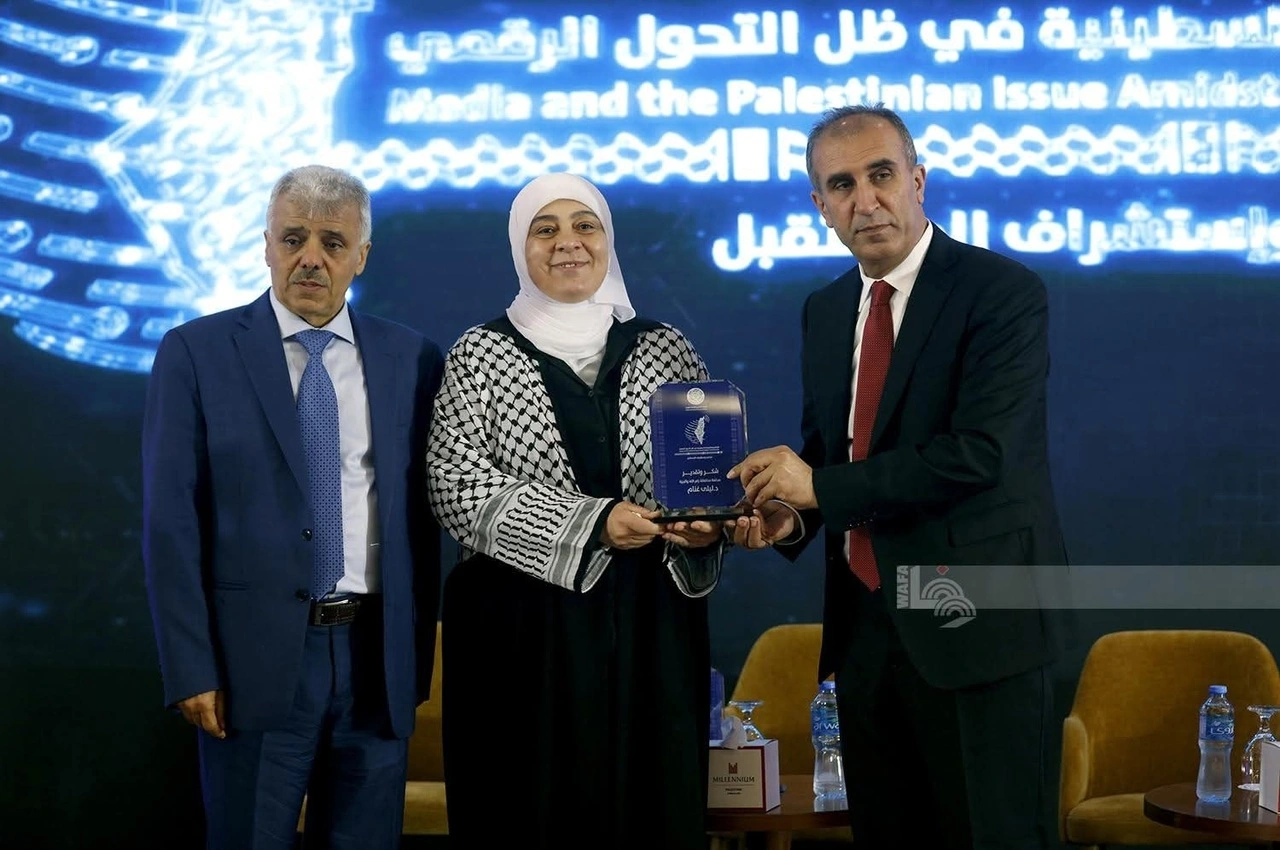


Under the patronage of H.E. Prime Minister Dr. Mohammad Mustafa, Palestine Technical University – Kadoorie launched its international scientific conference titled “Media and the Palestinian Cause in the Digital Age: Realities and Future Prospects.”
The conference brought together prominent national, media, and academic figures, along with researchers and representatives from both official and independent media institutions, with the aim of addressing the media challenges facing the Palestinian cause and exploring the future of media discourse in the digital era.
Representing the Prime Minister, the Minister of Higher Education and Scientific Research, Prof. Amjad Barham, conveyed Dr. Mustafa’s greetings and endorsement of the conference’s purpose. He emphasized the critical role of media in exposing the crimes of the Israeli occupation, supporting the Palestinian cause, and countering misinformation.
He noted that the conference takes place amid ongoing acts of genocide perpetrated by the occupation against the Palestinian people, including the systematic destruction of over 85% of university buildings in Gaza and the killing of academics, scientists, and students — an attempt to extinguish hope and the future of Palestinians.
Dr. Barham reaffirmed the Prime Minister’s support for the conference and its researchers, expressing gratitude to all organizers and wishing for impactful outcomes that support and strengthen the Palestinian narrative globally.
In his opening remarks, President of PTUK Prof. Hussein Shanak emphasized that this conference is being held at a critical time for the Palestinian cause, amid transformative shifts in global media driven by artificial intelligence and digital technologies. He described media as a central battleground in the struggle over narratives and influence, underscoring the importance of deep academic engagement with the conference’s themes to reinforce the media’s role in resisting occupation and promoting the Palestinian narrative.
Dr. Shanak also highlighted the university’s achievements in maintaining academic continuity despite challenges and its advancement in prestigious international rankings such as the QS Ranking and Times Higher Education Impact Rankings, reflecting its commitment to research, governance, and applied technology programs.
He also announced that, with the support of the Ministry of Higher Education and Accreditation & Quality Assurance Commission, the university has received approval to establish a Faculty of Allied Medical Sciences, furthering its academic mission.
He extended his gratitude to the Prime Minister for sponsoring the event, acknowledged the efforts of the scientific, preparatory, and media committees, and thanked all speakers, participants, and supporting partners — particularly Ooredoo Palestine — for their contributions to the success of this impactful event.
Speaking at the conference, Governor of Ramallah and Al-Bireh Dr. Laila Ghannam emphasized the media’s role in preserving national identity and confronting Israeli propaganda. She praised Kadoorie University for organizing a timely conference that bridges national media efforts with digital innovation, urging greater activation of Palestinian media in light of global technological shifts.
Dr. Ahmad Assaf, General Supervisor of Official Media, described the conference as a vital initiative during a time of escalating aggression in Gaza, the West Bank, and Jerusalem. He underscored that the struggle over the Palestinian narrative has lasted more than a century, with the Zionist movement building vast media power while Palestinians often lacked the tools for global influence.
The war in Gaza, he added, has proven the power of digital media to expose atrocities, despite the occupation's attempts to silence journalists through violence.
Dr. Assaf called for global solidarity with Palestinian journalists and independent media institutions and reaffirmed that the truth of the Palestinian cause cannot be silenced. “Palestine deserves every effort,” he concluded, “and truth will ultimately prevail.”
Conference Chair Dr. Walaa Al-Battat highlighted the academic and strategic importance of the event, noting the diversity and expertise of participants selected from both local and international institutions. She emphasized the conference as a platform for reshaping national media discourse and reinforcing the Palestinian narrative in the global digital space.
The conference featured four main sessions and several parallel academic panels, including:
1. Media Narratives and Interactive Discourse: Supporting the Palestinian Story, featuring Dr. Ahmad Assaf, Prof. Amr El-Leithy, Dr. Walaa Al-Battat, and Dr. Wissam Amer.
2. Digital Media and Global Public Opinion on Palestine: Impact and Strategies, with speakers Dr. Mohammad Abu Rub, Mr. Mahmoud Hrebat, Mr. Moataz Azaizeh, and Ms. Dana Abu Khudair.
3. Israeli Violations of Palestinian Journalists’ Rights: Realities and Challenges, with Mr. Nasser Abu Bakr, Mr. Shawan Jabarin, Ms. Yafa Abu Akar, and Mr. Ameed Shehadeh.
4. The Palestinian Cause in Arab and International Media: Coverage and Challenges, with Ms. Mona Al-Khalili, Prof. Gultan Hijazi, and Mr. Ismat Mansour.
Parallel academic sessions further explored media production and the professional and conceptual challenges facing Palestinian media professionals.